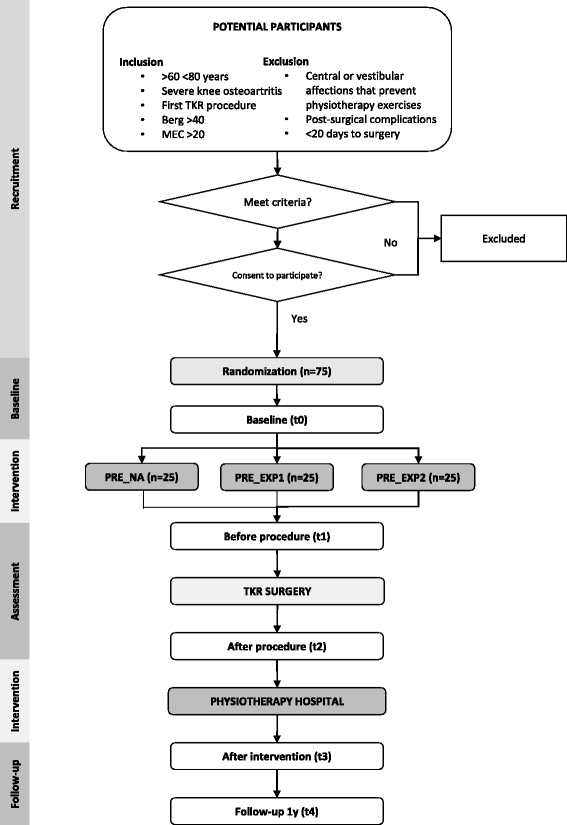In-home versus hospital preoperative balance and proprioceptive training in patients undergoing TKR; rationale, design, and method of a randomized controlled trial
- PMID: 29221471
- PMCID: PMC5723092
- DOI: 10.1186/s12891-017-1887-4
In-home versus hospital preoperative balance and proprioceptive training in patients undergoing TKR; rationale, design, and method of a randomized controlled trial
Abstract
Background: Severe knee osteoarthritis, as well as the surgical procedure of total knee replacement that aims to reduce its symptoms, cause great deterioration on the proprioceptive system. Taking this fact into account, and considering that balance abilities positively influence the capacity to perform basic functional tasks, this trial aims to find the short and mid-term effects of a preoperative balance and proprioceptive training when conducted by patients undergoing total knee replacement. Along with the effects, it is intended to determine whether in-home based training can be as effective as hospital training. The results will help to conclude whether the possible benefits may outweigh the health costs.
Methods: Seventy-five participants will take part. The trial will include in-home and supervised hospital experimental training compared to a non-active control group in order to estimate the actual effect of the proposal against the benefits due exclusively to the surgical procedure. Interventions last 4 weeks prior to surgery, and the follow-up will be at 2w, 6w, and 1y following the operation. The primary outcomes are in agreement with the goals: self-reported functionality in terms of KOOS and overall balance in terms of the Berg Balance Scale. The secondary outcomes will include the measurements of static and dynamic balance abilities, pain, function, and quality of life.
Discussion: It is expected for the results of this trial to provide relevant information in order to decide if a specific intervention is cost-effective to be implemented in clinical practice.
Trial registration: Clinicaltrials.gov identifier NCT03100890 . Registered in April 4, 2017.
Keywords: Balance; Physiotherapy; Preoperative intervention; Proprioception; Sensorimotor; Total knee arthroplasty; Total knee replacement.
Conflict of interest statement
Ethics approval and consent to participate
The trial was approved by the Ethical Committee for Clinical Research and by the Scientific Committee of the Hospital Politécnico y Universitario de La Fe de Valencia (2016/0499). The authors certify that they will obtain all appropriate patient consent forms. In the form the patients will give their consent to participate and for clinical information to be reported in the journal. The patients understand that their names and initials will not be published and due efforts will be made to conceal their identity.
Consent for publication
Not applicable.
Competing interests
The authors declare that they have no competing interests.
Publisher’s Note
Springer Nature remains neutral with regard to jurisdictional claims in published maps and institutional affiliations.
Similar articles
-
Supervised neuromuscular exercise prior to hip and knee replacement: 12-month clinical effect and cost-utility analysis alongside a randomised controlled trial.BMC Musculoskelet Disord. 2017 Jan 6;18(1):5. doi: 10.1186/s12891-016-1369-0. BMC Musculoskelet Disord. 2017. PMID: 28061841 Free PMC article. Clinical Trial.
-
Costs and effectiveness of pre- and post-operative home physiotherapy for total knee replacement: randomized controlled trial.J Eval Clin Pract. 2005 Jun;11(3):283-92. doi: 10.1111/j.1365-2753.2005.00535.x. J Eval Clin Pract. 2005. PMID: 15869558 Clinical Trial.
-
A randomized controlled trial assessing the effects of preoperative strengthening plus balance training on balance and functional outcome up to 1 year following total knee replacement.Knee Surg Sports Traumatol Arthrosc. 2021 Mar;29(3):838-848. doi: 10.1007/s00167-020-06029-x. Epub 2020 Apr 27. Knee Surg Sports Traumatol Arthrosc. 2021. PMID: 32342139 Clinical Trial.
-
Sensorimotor training prior total knee arthroplasty and effects on functional outcome: A systematic review and meta-analysis.Gait Posture. 2021 May;86:83-93. doi: 10.1016/j.gaitpost.2021.03.001. Epub 2021 Mar 5. Gait Posture. 2021. PMID: 33711615
-
Content and delivery of pre-operative interventions for patients undergoing total knee replacement: a rapid review.Syst Rev. 2022 Sep 2;11(1):184. doi: 10.1186/s13643-022-02019-x. Syst Rev. 2022. PMID: 36050795 Free PMC article. Review.
Cited by
-
Cost-effectiveness of prehabilitation prior to elective surgery: a systematic review of economic evaluations.BMC Med. 2023 Jul 19;21(1):265. doi: 10.1186/s12916-023-02977-6. BMC Med. 2023. PMID: 37468923 Free PMC article.
-
Effectiveness of using a chatbot to promote adherence to home physiotherapy after total knee replacement, rationale and design of a randomized clinical trial.BMC Musculoskelet Disord. 2023 Jun 15;24(1):491. doi: 10.1186/s12891-023-06607-3. BMC Musculoskelet Disord. 2023. PMID: 37322506 Free PMC article. Clinical Trial.
-
Effects of proprioceptive neuromuscular facilitation and both sides up ball exercise on pain level, range of motion, muscle function after total knee arthroplasty.J Exerc Rehabil. 2024 Feb 21;20(1):17-23. doi: 10.12965/jer.2448004.002. eCollection 2024 Feb. J Exerc Rehabil. 2024. PMID: 38433857 Free PMC article.
References
Publication types
MeSH terms
Associated data
LinkOut - more resources
Full Text Sources
Other Literature Sources
Medical
Miscellaneous


